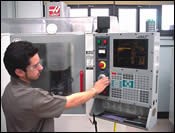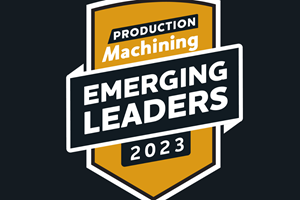Training Youth In Manufacturing Keeps Industry Growing
As U.S. and overseas manufacturing become more competitive, it's critical not only for manufacturers, but for school districts and technical colleges in the States, to focus on producing and maintaining a strong labor pool. Producing employees and students for the workforce who are well trained, knowledgeable and most importantly, interested in manufacturing is the key to a prosperous industry.
As U.S. and overseas manufacturing become more competitive, it’s critical not only for manufacturers, but for school districts and technical colleges in the States, to focus on producing and maintaining a strong labor pool. Producing employees and students for the workforce who are well trained, knowledgeable and most importantly, interested in manufacturing is the key to a prosperous industry.
The first step is to educate students as young as high school age about careers in manufacturing. Offering programs that attract their interest should be the main objective, while at the same time exposing them to metalworking machines and processes to inform them about the basics of the industry, according to Steve Glasder, machine lab instructor at East Leyden High School in Franklin Park (Chicago), Illinois. The folks at East Leyden see the advantages of this early training not only in keeping industry strong in the United States, but also in keeping industry in the Chicago area.
To make these programs and goals more easily attainable, the school has transformed its machining lab from a World War II designated training area to a modern facility. The shop has gone through many phases of change with the help of a school board that cares about the importance of industry training along with a dedicated advisory council whose heart and soul is in the school’s machine tool program.
“In a time where a lot of school boards do not consider industry training important, ours has made it a priority to keep this program going,” Mr. Glasder explains. “Before I came to the school 8 years ago, the superintendent could have given up finding someone to take the open position as machine lab instructor and dropped the whole program. Instead, she found and recruited me.”
Since 1995, when the advisory council was established, it has put more than $600,000 into the lab, which includes the purchasing of new equipment. Its first project was to update the shop from “a dungeon full of grease and grime” to a modern facility. Then, it began fundraising to buy the first new machine—a CNC from Haas Automation, Inc. (Oxnard, California).
“Gene Haas and his local distributor, Arthur Machinery (Elk Grove Village, Illinois), have been very generous in helping us with what we need and as far as pricing goes. We couldn’t ask for a better partnership. These companies really put their money where their mouth is,” Mr. Glasder says.
The initiative of the advisory council jumpstarted the machine lab’s remodeling process. After Mr. Glasder, or “Coach G” as his students call him, joined the staff at East Leyden, the program started coming together. It partnered with the Tooling and Manufacturing Association (TMA), Precision Machined Products Association (PMPA) and the Precision Metalforming Association (PMA). It also replaced a 70-year-old lathe that was in the shop and as a result of Mr. Glasder’s grant writing skills, the program was able to acquire ten new engine lathes with DROs.
“The key to making our program work is our advisory council,” Mr. Glasder adds. “I don’t think there is one better in the United States.”
Although excited about the lab’s growth, he realizes that maintaining an updated and modern training facility is an ongoing work in progress. “This year, we want to replace some of our 50-year-old vertical mills,” he says. “PMA has committed $10,000 for the project.” According to Mr. Glasder, if the school board sees such continued commitment in the industry, they will front the money to get the ball rolling.
The lab operates about 24 machines total, including lathes, vertical mills, CNCs, grinders and band saws. Most are relatively new, except for the vertical mills, which Mr. Glasder says he hopes to eventually replace with CNC machining centers.
East Leyden’s machine tool program consists of three classes: Machine Tool Technology, Advanced Machine Tool Technology, and CNC Machine Tool Technology. All classes are a year long and cover both manual machining and CNC operation.
Although Mr. Glasder is satisfied with his 100 to120 students in his machine lab classes, he is always proactive in recruiting new students by creating unique projects or events that draw attention to his program. He has tried go-cart rides and rides on a small version of a chopper around an outdoor track simply to get students thinking about taking his classes. “After offering the go-cart rides, my program went from 30 to 110 students in one year,” he says. “Once you generate interest, you have a class. But you have to get them there first.”
Getting students involved in the program is especially important to Mr. Glasder and East Leyden because of its location in an area with strong manufacturing presence. “In the Chicago area, about 30 percent of businesses are manufacturing-based. In Franklin Park, the population swells from 20,000 to 100,000 during the day because of people coming here to work,” Mr. Glasder explains. “We have mills, forging operations and suppliers in the area. In order to keep things going, we need a trained labor pool. If we don’t have that, business will move somewhere else, possibly even overseas. If we can give the workforce well-trained students, the industries will stay here.”
Because there is a demand in Chicago for manufacturing training, Mr. Glasder’s goal is to work with the PMA to further enhance and expand the program to benefit the area by adding an adult regional training facility to East Leyden for those already in the workforce. Since the high school is one of the few remaining in the area that offers intensive training for manufacturing, it is in an ideal position to develop such a facility. Also, according to Mr. Glasder, there is not a technical school solely devoted to manufacturing and CNC machining in the vicinity.
For now, however, the high school program is the main focus. Mr. Glasder’s objective for the course is for his students to gain a good understanding of how to set up and operate the machines in the school’s lab. “As far as programming goes, that takes time,” he says. “That takes more schooling, but they can at least operate these half a million dollar machines.”
Of the 100 to 120 East and West Leyden High School students who go through Mr. Glasder’s program annually, about 15 to 20 go out in the field to pursue careers in manufacturing. They begin this process by going through the TMA apprenticeship program in Illinois in which their employer pays for their education and training. “Another option for them is to go to a junior college that offers a technical curriculum, but generally they will go through the apprenticeship training,” Mr. Glasder explains. “The apprenticeship might take as long as 6 or 7 years to complete, but they are earning a full income while going to school for free.”
He reports that in the last 8 years, there have been about 120 students in his program who moved on to eventually work in manufacturing plants after their schooling was complete.
Remaining focused on producing quality students who later become valuable employees for the manufacturing workforce are Coach G’s objectives. Therefore, his goals are to develop the regional training facility at the school as well as generate more interest in his classes.
With Mr. Glasder’s energy and enthusiasm in the program combined with East Leyden’s proactive school board and the program’s advisory council, the school’s machine tool program is well on its way to reaching these goals and helping keep the area’s manufacturing labor force strong. Also, the program will be a model for other school districts and businesses within the district, teaching them that a successful program such as this one is attainable at their facilities.
For more information about this machine tool program or the organizations involved, contact East Leyden High School at (847) 451-3000 or visit www.leyden212.org
Related Content
Strengthening Manufacturing Workplaces Through Active Listening
A good strategy to weather the storms of manufacturing market upheavals and unpredictable factors is to commit to continuous, active employee listening.
Read More2023 Emerging Leaders Strengthen Their Staffs, Solve Problems
Superb critical thinking, top-notch leadership skills and a passion for building a strong team are a few of the common traits held by this year’s five Production Machining Emerging Leader award winners.
Read MoreThe Value of Aligning Efforts to Promote Manufacturing Careers
Successfully building the next generation of manufacturers requires a team effort between employers, educators and parents. Each of these three groups has a tremendous impact on young people’s career decisions. Without the support of all three, we are unlikely to bridge the skilled labor shortage that threatens the future growth of our industry.
Read MoreRecognizing Signs of a Degrading Workplace Culture
Is your machine shop missing key “culture elements?” Here are ways to identify if your organization is heading in the right or wrong direction in terms of establishing a healthy company culture.
Read MoreRead Next
Emerging Leaders Nominations Now Open
Here’s your chance to highlight a young person in your manufacturing business who is on the path to be a future leader moving your company forward.
Read MoreDo You Have Single Points of Failure?
Plans need to be in place before a catastrophic event occurs.
Read More5 Aspects of PMTS I Appreciate
The three-day edition of the 2025 Precision Machining Technology Show kicks off at the start of April. I’ll be there, and here are some reasons why.
Read More














.jpg;maxWidth=300;quality=90)














